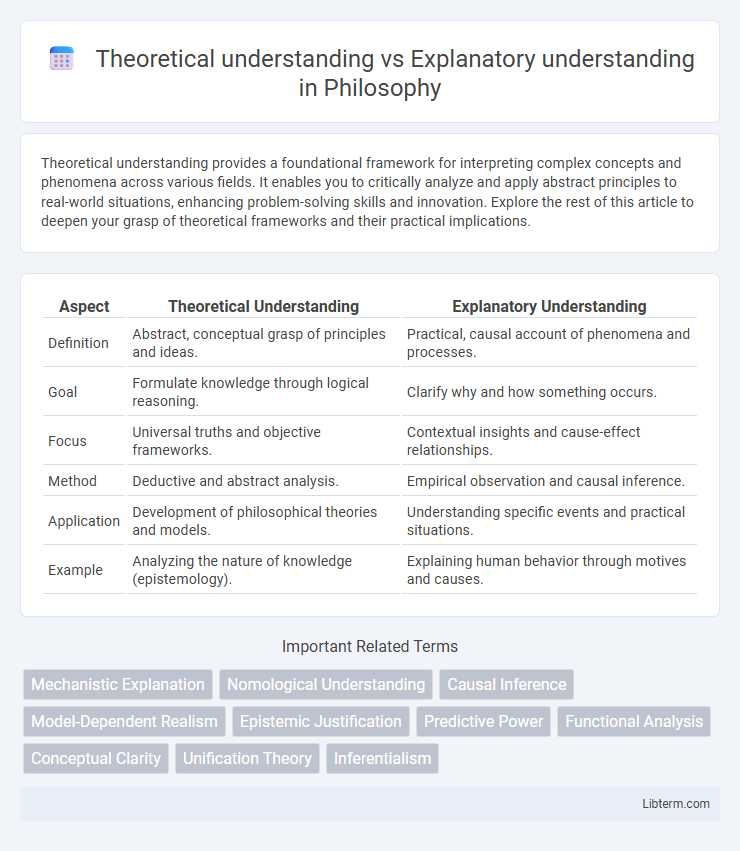Theoretical understanding provides a foundational framework for interpreting complex concepts and phenomena across various fields. It enables you to critically analyze and apply abstract principles to real-world situations, enhancing problem-solving skills and innovation. Explore the rest of this article to deepen your grasp of theoretical frameworks and their practical implications.
Table of Comparison
| Aspect | Theoretical Understanding | Explanatory Understanding |
|---|---|---|
| Definition | Abstract, conceptual grasp of principles and ideas. | Practical, causal account of phenomena and processes. |
| Goal | Formulate knowledge through logical reasoning. | Clarify why and how something occurs. |
| Focus | Universal truths and objective frameworks. | Contextual insights and cause-effect relationships. |
| Method | Deductive and abstract analysis. | Empirical observation and causal inference. |
| Application | Development of philosophical theories and models. | Understanding specific events and practical situations. |
| Example | Analyzing the nature of knowledge (epistemology). | Explaining human behavior through motives and causes. |
Defining Theoretical Understanding
Theoretical understanding refers to grasping abstract principles and models that explain phenomena within a structured framework, emphasizing conceptual knowledge and systematic reasoning. It involves identifying underlying laws and relationships that go beyond observable facts to provide a comprehensive account of why things occur. This form of understanding enables predictions and guides the development of new hypotheses by focusing on the coherence and validity of theoretical constructs.
Explaining Explanatory Understanding
Explanatory understanding involves grasping the underlying causes and mechanisms behind phenomena, enabling one to not only describe what happens but also why it happens. This type of understanding is crucial in fields like science and philosophy, where comprehending causal relationships and theoretical frameworks deepens insight beyond mere observation. It facilitates predictive power and problem-solving by connecting evidence to comprehensive models that reveal the rationale behind observable events.
Key Differences Between Theoretical and Explanatory Understanding
Theoretical understanding involves grasping abstract principles and frameworks that explain phenomena, while explanatory understanding focuses on providing clear, context-specific reasons behind particular events or observations. Theoretical understanding emphasizes generalized knowledge applicable across multiple scenarios, whereas explanatory understanding prioritizes detailed, causative insights that clarify why something happens. Key differences lie in the scope of abstraction and the depth of causal explanation provided by each approach.
Historical Perspectives on Understanding
Historical perspectives on understanding distinguish theoretical understanding as the intellectual grasp of abstract principles, while explanatory understanding centers on making sense of specific events or phenomena. Theoretical frameworks often emerge from philosophical traditions tracing back to Plato and Aristotle, emphasizing universal truths and systematic knowledge. Explanatory understanding is rooted in historiography and narrative traditions, aiming to contextualize and interpret historical events through cause-and-effect relationships.
Role of Theory in Scientific Knowledge
The role of theory in scientific knowledge centers on providing a structured framework for both theoretical understanding and explanatory understanding. Theoretical understanding involves abstract models and principles that predict phenomena, while explanatory understanding clarifies causal relationships and mechanisms behind observed data. Effective scientific theories integrate predictive power with explanatory depth to advance knowledge and guide empirical research.
How Explanations Foster Learning
Explanations foster learning by bridging the gap between theoretical understanding and practical application, making abstract concepts more accessible and relatable. They contextualize information, enabling learners to connect new knowledge with existing cognitive frameworks and enhance retention. Effective explanations also promote critical thinking and problem-solving by illustrating causal relationships and underlying mechanisms rather than just presenting isolated facts.
Philosophical Debates on Types of Understanding
Theoretical understanding emphasizes grasping abstract principles and systematic knowledge, focusing on predicting and explaining phenomena within philosophical frameworks. Explanatory understanding prioritizes the ability to interpret and make sense of specific events or experiences, often grounded in contextual and teleological insights. Philosophical debates explore tensions between these types, highlighting differences in epistemic aims, methods of justification, and the roles of causal versus interpretive explanations.
Examples in Science: Theory vs Explanation
Theoretical understanding in science involves abstract frameworks like Newton's laws, which predict planetary motion through mathematical models. Explanatory understanding focuses on making phenomena clear, such as explaining gravity by demonstrating how mass warps spacetime in general relativity. While theory provides the structured predictions, explanation bridges those models to observable events, enhancing comprehension through concrete examples.
Practical Implications in Education
Theoretical understanding in education emphasizes abstract concepts and principles, enabling educators to grasp foundational knowledge, while explanatory understanding focuses on interpreting and applying these concepts to real-world classroom scenarios. Practical implications include the ability of explanatory understanding to enhance instructional strategies, improve student engagement, and tailor learning experiences based on contextual factors. Integrating both types of understanding fosters more effective teaching methods and supports adaptive learning environments that respond to diverse student needs.
Integrating Theoretical and Explanatory Approaches
Integrating theoretical and explanatory understanding enhances cognitive frameworks by combining abstract principles with causal mechanisms to provide a comprehensive grasp of phenomena. This approach leverages theoretical models to predict outcomes while employing explanatory understanding to clarify underlying processes, creating a synergistic effect that improves problem-solving and decision-making accuracy. Applying this integration in scientific research and education fosters deeper insight, bridging gaps between conceptual knowledge and practical application.
Theoretical understanding Infographic

 libterm.com
libterm.com